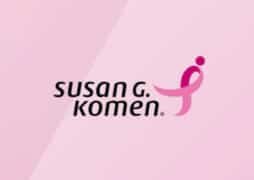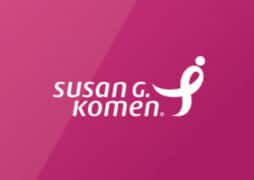Komen Increases Focus on Patient Care to Meet Growing Need; Calls National Breast Cancer Awareness Month “Our Moment to Save Lives”
Susan G. Komen®, the world’s leading breast cancer organization, is warning that decades of progress in lowering breast cancer mortality rates may be in jeopardy due to the ongoing COVID-19 pandemic and called for a united response to help save lives during this year’s National Breast Cancer Awareness month. Komen noted that in response to the growing need for financial support and overcoming barriers to care, the organization has increased its focus on providing care and support directly through its Patient Care Services Center, the demand for which has more than doubled over the past year.
“Facing a breast cancer diagnosis is difficult in the best of times, but more so during the uncertainty of a pandemic,” said Paula Schneider, a breast cancer survivor and Komen’s CEO. “More people than ever are encountering challenges in accessing and continuing needed care. Many have lost their jobs, health insurance and are facing new financial challenges. The pandemic has also highlighted persistent and tragic racial disparities, like the startling reality that Black women in the U.S. are about 40 percent more likely to die from breast cancer than white women. Our support is needed now, more than ever. Yet meeting those needs will only be possible thanks to the generosity and passion of our donors and fundraisers.”
Komen noted that there are many ways that people can help support Komen’s advocacy, research and patient care programs, from fundraising through one of the organization’s local Race for the Cure or MORE THAN PINK Walk events, supporting someone walking in the Komen 3-Day, 60 mile walk, supporting one of Komen’s LIVE Pink partners, or by doing a personal fundraiser that is meaningful to you, such as hosting a Dress Up to Take Down Breast Cancer educational session or fundraiser at work.
The need for support is clear and growing more urgent by the day. Komen noted that while progress has been made in lowering mortality rates from breast cancer by 41 percent in the U.S. since 1989 thanks to more than three decades of increased access to early detection and more effective treatments, the trajectory of that progress is now in jeopardy due to COVID-19’s lingering impact on breast health care.
Without a renewed focus on early detection and efforts to maintain people in the continuum of care, as well as investments in improved treatments, we are likely to see more people die from the disease. Even without taking the impact of COVID-19 on screening and treatment into account, more than 44,000 people are expected to die this year from breast cancer in the U.S. alone. Now, due to the pandemic, which has caused people to become hesitant to get screened or see a doctor, suddenly become uninsured or face new financial challenges, people are facing new delays and barriers to care that are likely to have tragic consequences.
- Initial reports from the National Cancer Institute in 2020 suggested there could be an excess of 10,000 deaths due to breast and colorectal cancer by 2030 due to the pandemic.
- A newer model in July 2021, suggests about 2,500 excess deaths from breast cancer by 2030 are expected to occur due to reduced screening, delays in diagnosis and decreased chemotherapy use among women with estrogen receptor positive early breast cancer.
- While screening rates are rebounding from the pandemic lows, we are still catching up for many people who should have already been screened and diagnosed. This may lead to a surge of new breast cancers, with later stage diagnoses and increased mortality.
- While healthcare systems were able to adapt and adjust treatment regimens to better support patients during this challenging time, many people experienced a change or delay in treatment in the midst of the pandemic.
In response to the growing and evolving demand for direct support for those facing breast cancer today, Komen has developed a new national Patient Care Center to help people overcome barriers to care, no matter where they live. These services include a free Breast Care Helpline, where callers are connected to a trained oncology social worker who provides emotional support education, and access to resources such as financial assistance, patient navigation and more. The need for these care services continues to grow. For example, this year:
- Demand for Komen’s free Breast Care Helpline has increased by 35 percent year-over-year.
- Komen’s Treatment Assistance Program has provided financial support for thousands of patients and has seen a 155 percent increase in the number of patients served compared to last year.
- Komen recently added eight patient navigators to its team to connect patients to support and resources that will help keep them in the continuum of care. The organization plans to add nine more navigators by the spring of 2022 to meet the growing need.
“In a single moment, a person’s life changes forever – there is life before breast cancer, and life after,” noted Schneider. “This October, as part of National Breast Cancer Awareness Month, we are asking people to take a moment to make a difference in the lives of their neighbors. One action can help save a life.”


